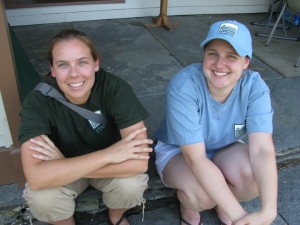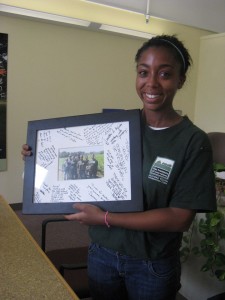When the student becomes the master (of history)
22 June 2012 – Kate Preissler
There are many transitions we go through when we leave graduate programs and start working as public historians. A hard one for me was the transition from student to role model and possible mentor to others working in the field of history.

Most of the interns that work with me are graduate students around my age, which was intimidating at first until I realized that in addition to our work together, where we could learn from each other, many were becoming friends. (In the photo that’s me at left with former Trustees intern and current good buddy, Jess).
Despite having been a role model for youth in my programs for years, it was different and more intimidating to think about myself as a potential role model in the field of public history for highly talented grad students, many my own age. Now, I was in position to inspire students to consider public engagement at cultural landscapes as a possible career choice, but I felt like I was still, myself, in the process of learning. Most of the students who work with us come with incredible depths of knowledge in areas that I never studied. All I could think was, “Who am I to tell them how to do this project?”
Recently, though, I have overcome some of those insecurities to better understand what it means to be a role model in the field of public history; how it differs from the mentorship role that professors and others who work in higher education play; and how each of us, even those like me who are new to the field, can play an influential role in shaping active, engaged, and innovative public historians.
My reflections on the topic were partially inspired by a trip north last month to celebrate the forty-five-year career of my undergraduate history advisor, Professor John R. Cole.
Ten years had passed since I had been his student, but hearing him speak at his retirement, I was transported by his voice back to that time when I was not yet a historian. As an English major and writer, history classes for me started out mostly as an interesting way to knock off some Gen Ed requirements. In his classes, John Cole taught me how my skills (which do not include an ability to easily remember dates or names) were valuable to the field of history. Without him, it would not have occurred to me that becoming a historian was something that I could or should do. Moved by the significant part that he had played in my life, I began to consider whether I would ever get to influence someone’s life in that way.
I wonder for how many graduate students the prospect of providing academic guidance that may shift the course of careers and even lives, is as much of a draw as the pursuit of their own scholarship. I know that for me, just thinking about working as a college professor (or at least the idealized version of one that is still in my imagination despite the fact that I should know better) still causes some real professional yearning.
But public historians don’t have to despair just because academia is where many commonly think of finding mentors.
Take my case: I had felt insecure because I had looked at my situation in the wrong way. I am not here to play the same role that John Cole played for me; I am not a professor and it is not my role to teach these students about American history.
I started to think differently about myself in relation to my interns; I stopped thinking about all of the historical facts that they knew that I didn’t and started to concentrate on the strengths and skills I developed through my work. I began to ask questions such as:
- “How can I help this person feel empowered through his/her work on this project?”
- “What can I teach this person that will make him/her more successful as a public historian?”
- “What can I do to make this person excited to be a public historian?”
- And especially, “What positive attitudes, language and behaviors am I modeling for the students who work alongside me?”
Once I started asking the right questions, I discovered that I have a lot to offer to those who are testing the waters of community engagement for the first time.

“I know I will always keep these summers close to my heart. I have grown with my students as well as the organization, trading in my Converse for a pair of sturdy hiking boots, my perfume for the fragrant combination of Technu and bug spray, and ultimately abandoning my career goals of working for the Federal Reserve in exchange for a degree in American Studies focusing on race and immigration.” – 2011 intern
I have a deep respect for the knowledge that these students have worked to develop and I love to facilitate projects where they get to use what they already know to add value to our sites. I love to collaborate and have experience mediating between groups and individuals to come to a shared vision. I am endlessly enthusiastic when it comes to history but am now able to harness enthusiasm into productivity. I like to push students out of their comfort zones and have them take the lead, make decisions, and create end products that truly reflect their own work while providing them with the safety net of my experience. When they struggle, I have developed the skills to walk them through the steps needed to be successful. I put my complete trust in them to get the work done (and done well) by always having them work on projects – sometimes high-profile projects — which will end up in front of our visitors. I have practical skills that I can pass on to students including how to create (and work within) a budget, how to speak slowly for a radio interviews, and how to laugh and smile with volunteers on your sixth or seventh straight day of work. I have skills specific to a public historian.
Although it is hard to match that special role that teachers play in our development, I do think that there are plenty of opportunities to be mentors for those of us who have chosen to do history outside of the academic world. I’d also like to think that through our mentoring work, young historians will dream of working in communities, helping to define policies, preserving places, and all of the other services public historians provide just as often as they dream of ivory towers.
~ Kate Preissler



